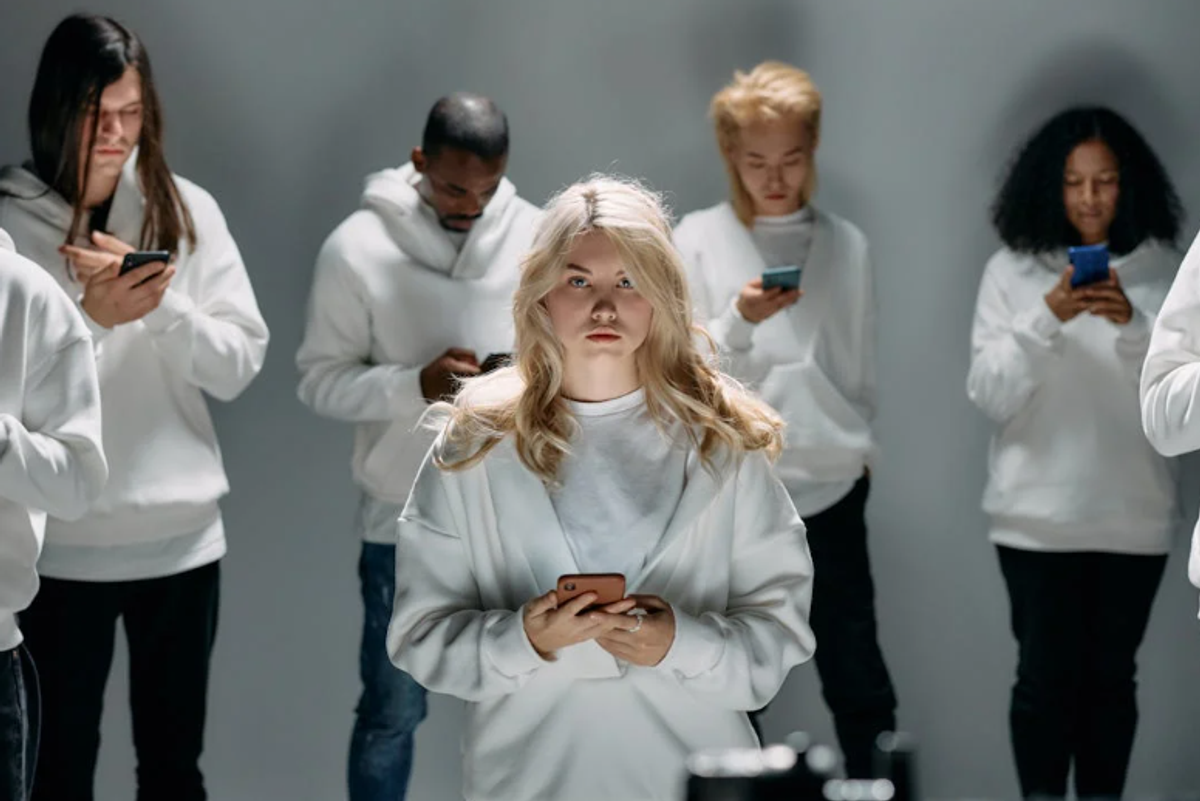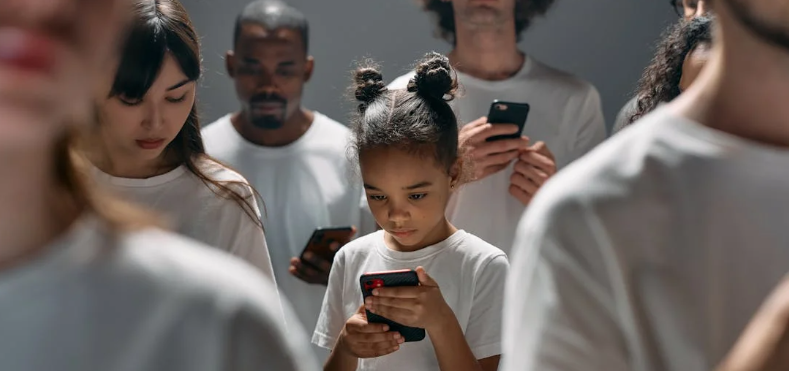Is social media ‘killing the real you’? A simple equation may hold the answer.
Are you ever alone with your own thoughts anymore?

A woman is losing herself to her smartphone.
When we ask ourselves, “Who am I?” there are many different places to go for answers, whether it’s psychology, spirituality, or connecting with our inner barometer that tells us when we’re being authentic.
There’s also the big question: Is life about finding oneself or creating oneself? Is there a true you lurking deep inside your heart and mind, or is life all about creating the person you always wanted to be through discipline and self-cultivation?
One thing is for sure: our thoughts are a big part of who we are. As the Buddha once said: “We are what we think. All that we are arises with our thoughts. With our thoughts we make the world.”
However, in a world where so many people are constantly locked into their smartphones, consuming everyone else’s thoughts on TikTok, YouTube, Reddit, Facebook, Twitter, and Instagram, at what point do we lose our unique sense of self after being filled with others' ideas?

This question was recently brought up on Reddit, where Accomplished-Bend898 made an interesting point about the self in the social media era.
“Social media is killing you, but not in the way you think,” Accomplished-Bend898 wrote. “When you passively consume so much content, it fills your brain. To the brim. And at the same time, you aren’t spending any time alone with your own thoughts. You’ve become a consumer, not a contributor.”
“So your own, true thoughts start to merge with the hivemind of the internet,” the Redditor continued. “And whatever information the algorithms think you want to hear becomes what you actually believe. And so you are becoming less and less you.”
Accomplished-Bend898 simplified their theory into a math equation: “Passive content consumption - time alone with your own thoughts = the death of the real you.”
The idea that social media is killing people’s individuality is a bold and scary claim in a world where nearly everyone is on one platform or another. But for many, it rings true. Have you known anyone who fell down a rabbit hole on Twitter or TikTok, and their worldview began to change slowly over time? The more they viewed videos or tweets on a topic, the more the algorithm fed them the same content, creating a feedback loop that forever altered their personality.
If social media hasn’t wholly cut off people’s internal monologues and moments of thoughtful solitude, then they have definitely been curtailed. Studies show that the average person now spends 2 hours and 23 minutes a day looking at social media.
Although it’s hard to determine whether social media crowds out our own thoughts, it does cause cognitive overload, which makes it difficult to focus and process information correctly. This, in turn, makes it harder to think deeply about the information presented to us, making it easier to fall for misinformation.
Whether or not social media is killing “the real you” or “real us,” it has, undeniably, stunted our collective ability to hear our own thoughts.

Social media allows people to express themselves in ways that were unimaginable 20 years ago. However, instead of breeding a culture of individualism, it has created one of collectivism, where people are eager to follow the latest trends or conform to groupthink.
“Trends create a culture of conformity; if one doesn’t stay up to date with what’s ‘in,’ they are quickly categorized as ‘other.’ Extending beyond social media, people who wear certain clothing or listen to music that isn’t considered relevant to today’s trends are instantly judged,” Anahai Pellathy writes at The Standard. “Rather than choosing what to wear or how to act based on personal preference, people tend to rely upon trends and external perceptions.”
In addition, people are less likely to flaunt their individuality when they believe their actions are being judged by those who view their posts.
“Authenticity suffers under the constant gaze,” Hoan Westerberg, a writer focused on technology’s effect on people, writes on Medium. “Psychological studies show heavy social media users report lower self-esteem and life satisfaction than light users. When we constantly evaluate ourselves through the lens of others, we lose sight of our core identity.”
Although much work remains to determine whether spending too much time on social media is really “killing the real you,” there are enough warning signs to be concerned that we are losing the best part of ourselves to technology.

So, if you’re looking to reconnect with your true self, Accomplished-Bend898 has some suggestions for reducing screen time or making it healthier.
Don’t sleep next to your phone
Your brain will crave the first thing you feed it, so wait at least an hour after waking up to check it for anything.
Get a good screen time app
Built-in screen time settings are no match for your monkey brain. BePresent is my favorite because it uses actual psychology to combat phone addiction.
Delete social media from your phone
Force yourself to use it only on your computer so it is more intentional.
Turn your phone to greyscale
Greyscale will make your screen time a lot more boring. On an iPhone, go to Settings > Accessibility > Display & Text > Color Filters > Grayscale.
Replace scrolling with another activity
When you reduce your screen time by several hours per day, you need to replace it with something meaningful in your life. Start small and find out what motivates you.



 A Generation Jones teenager poses in her room.Image via Wikmedia Commons
A Generation Jones teenager poses in her room.Image via Wikmedia Commons



 A van travels down the road.
A van travels down the road.  A person plays the guitar.
A person plays the guitar.  A man smiles.
A man smiles.  A damaged vehicle sits on the side of a road.
A damaged vehicle sits on the side of a road. 